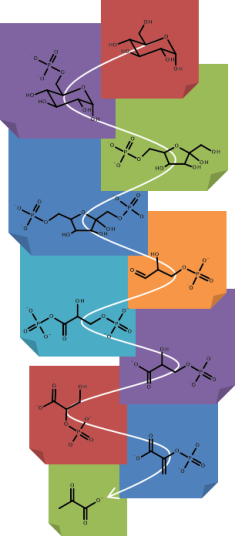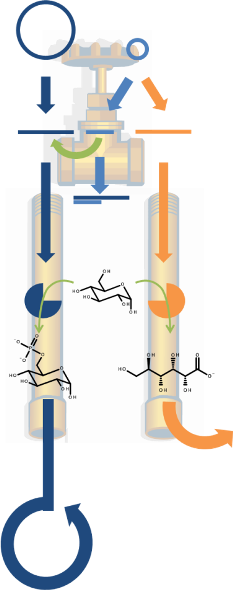Our current research falls into one of three main categories:
Design and assembly of novel pathways for biological synthesis
Enhancement of enzyme activity and control of metabolic flux
Bioprocess engineering and design
Design and assembly of novel pathways for biological synthesis
 Biological systems have the potential to produce a wide array of compounds with uses that include fuels, materials, bulk chemicals, and pharmaceuticals. The potential for biological conversion of feedstocks to bulk chemicals is enhanced by the availability of tools and techniques from the established discipline of Metabolic Engineering, which has enjoyed tremendous successes in the development of highly productive microorganisms for a variety of products of interest. We can also gain insights from Biocatalysis, where the choice of enzymes to mediate biotransformation of chemical substrates is based largely on consideration of the required functional group conversion without being limited by prior evidence of transformation of the full structure. Our group is focused on applying principles from each of these intellectual arenas towards the design and construction of novel biosynthetic pathways for specified target compounds, with the ultimate goal of increasing the synthetic capacity of biological systems. This “retro-biosynthetic design” approach is aided by advancements in the development of new tools under the umbrella of Synthetic Biology that facilitate re-engineering of biological systems. We take a largely experimental approach to develop the described retro-biosynthetic framework for de novo proposition of biosynthetic pathways. We select molecules of interest, propose potential synthetic pathways, and begin construction of engineered microbial chemical factories.
Biological systems have the potential to produce a wide array of compounds with uses that include fuels, materials, bulk chemicals, and pharmaceuticals. The potential for biological conversion of feedstocks to bulk chemicals is enhanced by the availability of tools and techniques from the established discipline of Metabolic Engineering, which has enjoyed tremendous successes in the development of highly productive microorganisms for a variety of products of interest. We can also gain insights from Biocatalysis, where the choice of enzymes to mediate biotransformation of chemical substrates is based largely on consideration of the required functional group conversion without being limited by prior evidence of transformation of the full structure. Our group is focused on applying principles from each of these intellectual arenas towards the design and construction of novel biosynthetic pathways for specified target compounds, with the ultimate goal of increasing the synthetic capacity of biological systems. This “retro-biosynthetic design” approach is aided by advancements in the development of new tools under the umbrella of Synthetic Biology that facilitate re-engineering of biological systems. We take a largely experimental approach to develop the described retro-biosynthetic framework for de novo proposition of biosynthetic pathways. We select molecules of interest, propose potential synthetic pathways, and begin construction of engineered microbial chemical factories.
Enhancement of enzyme activity and control of metabolic flux
Engineered metabolic pathways are typically sub-optimal, with enzyme activities well-below desired levels. Additionally, competition with endogenous pathways leads to low yields and productivities. Research in this area is focused on the improvement of our rationally designed microbial chemical factories, both through protein engineering and through the development and application of novel biological devices. Our protein engineering efforts are done in collaboration with computational structural biologists, and are focused on both the enhancement of enzyme activity and increased selectivity for the substrates of interest. Novel biological designs are intended to control metabolic flux in order to increased pathway throughput or counter competition with endogenous metabolism.
Bioprocess Engineering and Design
Our interest in bioprocess engineering and design is based on the realization that achievements at small scale must be translated to more commercially-relevant systems to have impact. Research in this area has focused on new process configurations for fermentations as well as on development of mathematical models for both descriptive and predictive purposes. Related work is geared towards engineering microbial strains for more favorable performance in bioprocesses. Our integrated focus on bioprocess considerations should facilitate the translation of our research into the marketplace.

